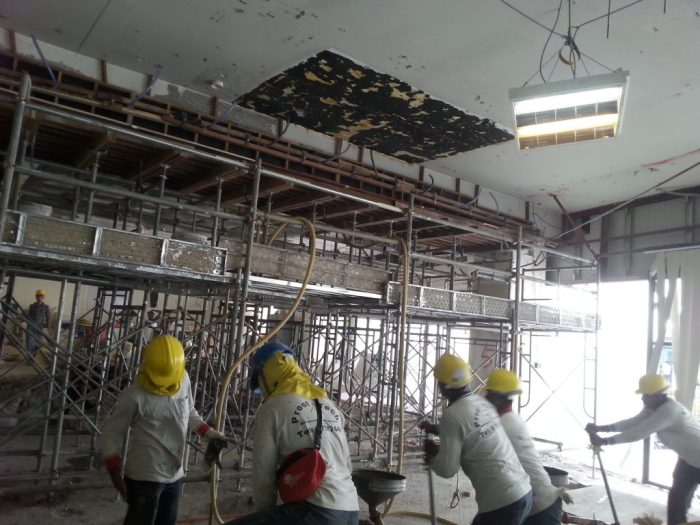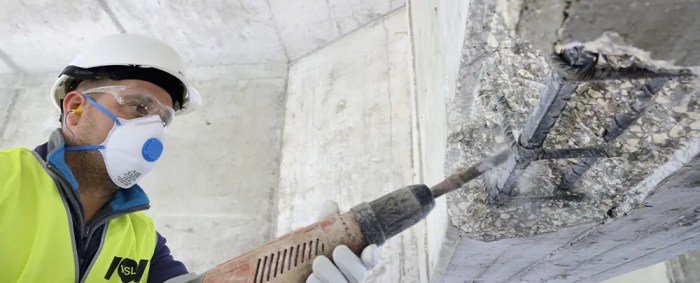Title: Essential Guide to Structural Repair Contractors
Starting off with structural repair contractors, this introduction aims to provide an intriguing overview of their crucial role in maintaining building safety and integrity. From necessary skills to innovative repair techniques, this guide covers everything you need to know about structural repair contractors.
Importance of Structural Repair Contractors

Structural repair contractors play a crucial role in maintaining the safety and integrity of buildings. Their expertise is essential in identifying and addressing structural issues that could compromise the stability of a structure over time.
Identifying Structural Issues
Structural repair contractors are trained to recognize signs of structural damage, such as cracks in walls, sagging ceilings, or uneven floors. By conducting thorough inspections, they can pinpoint areas that require immediate attention to prevent further deterioration.
Specialized Knowledge and Skills
These contractors possess the specialized knowledge and skills needed to implement effective repair solutions. Whether it's reinforcing a foundation, repairing damaged support beams, or stabilizing a leaning structure, their expertise is invaluable in ensuring the longevity of a building.
Preventing Catastrophic Failures
Neglecting structural repairs can have serious consequences, including the risk of catastrophic failures. Timely intervention by structural repair contractors can prevent disasters such as building collapses, which not only pose a threat to occupants but also result in costly repairs and legal liabilities.
Skills and Qualifications
Becoming a successful structural repair contractor requires a unique set of skills and qualifications that set them apart from the average contractor. These professionals play a crucial role in ensuring the safety and integrity of buildings and structures.
Necessary Skills and Qualifications
- Strong knowledge of structural engineering principles: A solid understanding of how structures work and how to repair them is essential.
- Excellent problem-solving abilities: Structural repair contractors must be able to identify issues and come up with effective solutions.
- Attention to detail: Precision is key when working on structural repairs to ensure the safety of the building.
- Physical strength and stamina: The job can be physically demanding, requiring the ability to lift heavy materials and work in challenging environments.
Training and Certifications
While a formal education in structural engineering or construction is beneficial, many contractors gain experience through on-the-job training and apprenticeships. However, obtaining certifications such as the Structural Repair Specialist Certification can demonstrate a contractor's commitment to excellence and knowledge in the field.
Importance of Ongoing Education
Staying updated with the latest industry standards and techniques is crucial for structural repair contractors. Continuing education courses and workshops can provide valuable insights into new technologies and methods that can improve the quality of their work and ensure compliance with regulations.
By investing in ongoing education, contractors can stay competitive in the industry and deliver the best possible outcomes for their clients.
Structural Repair Techniques

When it comes to structural repair, contractors employ various techniques to address issues like foundation cracks, water damage, and other structural concerns. Choosing the right technique is crucial to ensure the long-term stability and safety of the structure.
Common Techniques Used by Structural Repair Contractors
- Injection Grouting: This technique involves injecting grout or epoxy into cracks to stabilize and strengthen the foundation.
- Carbon Fiber Reinforcement: Carbon fiber sheets are applied to reinforce and strengthen walls, beams, and columns.
- Underpinning: This method involves strengthening the foundation by extending it to a deeper, more stable soil layer.
Innovative Repair Methods in the Industry
- Self-healing Concrete: Some contractors use self-healing concrete, which contains capsules of healing agents that can repair cracks autonomously.
- Advanced Monitoring Systems: Contractors are utilizing advanced monitoring systems to detect structural issues early on and prevent further damage.
Importance of Choosing the Right Technique
It is essential to select the appropriate repair technique based on the specific structural issue at hand. Using the wrong method can lead to ineffective repairs, further damage, and potential safety hazards. By understanding the nature of the problem and consulting with experienced professionals, property owners can ensure that the structural repair is done correctly and effectively.
Project Management and Communication
Effective project management and communication are crucial for the successful completion of structural repair projects. It requires a combination of organizational skills, leadership abilities, and clear communication with all parties involved.
Project Management Skills
- Planning and Scheduling: Developing a detailed plan for the repair process, including timelines and milestones.
- Resource Management: Allocating materials, equipment, and manpower efficiently to ensure smooth progress.
- Risk Assessment: Identifying potential risks and developing strategies to mitigate them.
- Budget Management: Monitoring expenses and ensuring the project stays within budget constraints.
Importance of Effective Communication
Effective communication is essential to ensure that all stakeholders are on the same page throughout the repair process. It helps in setting clear expectations, addressing concerns promptly, and fostering a collaborative environment.
Tips for Clear Communication
- Regular Updates: Provide regular updates to clients and stakeholders on the progress of the project.
- Listen Actively: Listen to the concerns and feedback of clients and address them promptly.
- Use Multiple Channels: Utilize emails, phone calls, and in-person meetings to ensure clear communication.
- Document Everything: Keep detailed records of all communication and decisions made during the project.
Final Conclusion
In conclusion, structural repair contractors play a vital role in ensuring the structural stability of buildings. By understanding their importance, skills, techniques, and communication strategies, you can make informed decisions when dealing with structural repairs. Stay informed, stay safe.
Question Bank
What specific situations require the expertise of structural repair contractors?
Structural repair contractors are crucial in situations involving foundation cracks, water damage, and structural instability that compromise the safety of buildings.
What are the necessary skills and qualifications to become a structural repair contractor?
To become a structural repair contractor, one needs a combination of construction knowledge, problem-solving skills, and relevant certifications in structural repair.
How important is ongoing education for structural repair contractors?
Ongoing education is crucial for structural repair contractors to stay updated on industry standards, new techniques, and technologies to provide effective repair solutions.
Why is effective communication essential in structural repair projects?
Effective communication ensures that all stakeholders, including contractors, clients, and other parties involved, are on the same page throughout the repair process, leading to successful project outcomes.




